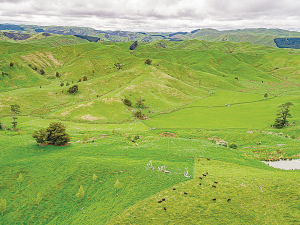The dirt on soil: Why healthy soil matters
OPINION: Every year, December 5 marks World Soil Day. This date wasn’t chosen at random, it’s the birthday of the late King Bhumibol Adulyadej of Thailand, a passionate advocate for soil stewardship.
 The pact underscores a joint commitment to advancing new and better farming and growing practices in New Zealand’s agricultural sector.
The pact underscores a joint commitment to advancing new and better farming and growing practices in New Zealand’s agricultural sector.
The signing of a Memorandum of Understanding (MOU) between Lincoln University and Ballance Agri-Nutrients is being hailed as a significant milestone.
The pact underscores a joint commitment to advancing new and better farming and growing practices in New Zealand's agricultural sector.
Lincoln University's Provost, Professor Chad Hewitt says the agreement establishes a framework for ongoing collaboration, with a focus on identifying and prioritisig opportunities for joint projects.
"These opportunities include improving planning and co-ordination, conducting research and demonstrations on Lincoln University's farms and enhancing environmental stewardship.
"The collaboration also seeks to foster innovation, commercialisation, and promotion of the agricultural sector to the public and policy makers."
One key aspect of this partnership is that it creates a foundation for ongoing and future collaboration with the university says Dr Stuart Kay, innovation leader at Ballance.
"We believe this collaboration will have a positive impact on our industry and will strengthen our connections with universities while showcasing our commitment to innovation and sustainability.
"We are keen to continue our journey of innovation, sustainability, and collaboration."
Both Lincoln University and Ballance share a common vision of a prosperous, sustainable, and innovative future for New Zealand's primary industries. By joining forces, they aim to drive positive change for Kiwi farmers and growers, ensuring they remain profitable and sustainable while meeting the increasing expectations of consumers, both in New Zealand and around the world.
Climate change has brought a pressing need for rapid and effective solutions, especially in areas like greenhouse gas emissions, carbon farming, and carbon sequestration. Lincoln and Ballance say they are committed to tackling these challenges head-on, as well as promoting on-farm diversification and adapting to climate-impacted land use changes.
Dairy Women's Network (DWN) has announced that Taranaki dairy farmer Nicola Bryant will join its Trust Board as an Associate Trustee.
Rural Women New Zealand (RWNZ) says it welcomes the release of a new report into pay equity.
Red meat exports to key quota markets enjoyed $1.4 billion in tariff savings in the 2024-25 financial year.
Remediation NZ (RNZ) has been fined more than $71,000 for discharging offensive odours described by neighbours as smelling like ‘faecal and pig effluent’ from its compositing site near Uruti in North Taranaki.
Two kiwifruit orchards in the Bay of Plenty and one in Northland are this year's finalists for the Ahuwhenua Trophy competition.
The Government's chief science advisor, Dr John Roche says the key objective for the science sector in the coming year is bedding down the reforms which sees the merger of the previous entities.
OPINION: Staying with politics, with less than nine months to go before the general elections, there’s confusion in the Labour…
OPINION: Winston Peters' tirade against the free trade deal stitched with India may not be all political posturing by the…